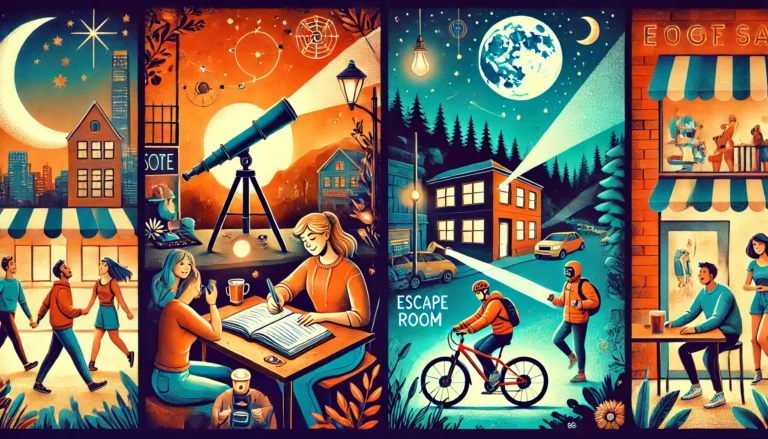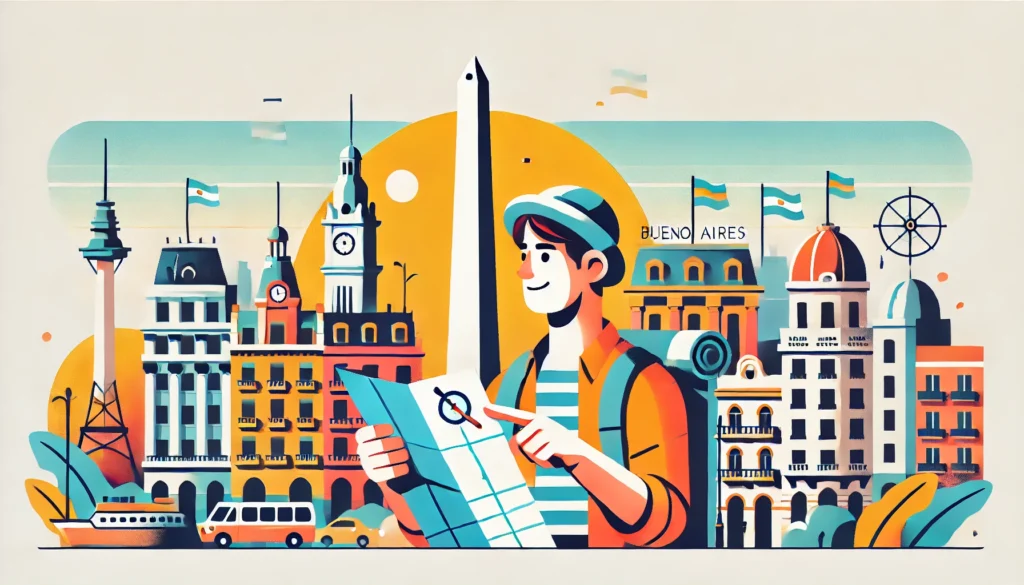
Argentina is a captivating blend of stunning natural landscapes, vibrant cities, and rich cultural heritage.
For many travelers, the allure of tango-filled nights, world-renowned Malbec wines, and the mesmerizing sight of Iguazu Falls is irresistible.
However, one question often comes to mind: Is Argentina safe for tourists?
In this guide, we’ll provide an honest, up-to-date overview of safety in Argentina, equipping you with essential travel tips to ensure a safe and memorable trip.
Current Safety Overview in Argentina
Current Safety Overview in Argentina
Argentina, one of South America’s most visited destinations, offers travelers an intriguing mix of cultural vibrancy, stunning natural landscapes, and diverse experiences.
While it remains a relatively safe place to explore, like any destination, it presents certain challenges and considerations that tourists should be mindful of.
Overall, Argentina is known for its stability and warm hospitality towards visitors.
Violent crime against tourists is rare, and the country enjoys a generally positive global reputation as a travel destination.
However, petty crime such as pickpocketing, bag-snatching, and scams can be more prevalent, particularly in major cities and tourist-heavy areas.
This mirrors safety challenges faced by many bustling international destinations.
In urban centers like Buenos Aires, Córdoba, and Rosario, travelers may encounter busy streets and crowds that offer both excitement and opportunities for crime, such as distracted pickpocketing.
For this reason, exercising caution, staying aware of your surroundings, and securing your valuables are essential practices for a smooth trip.
On a positive note, recent efforts by the Argentine government have focused on improving tourist safety through increased police presence in key areas, improved street lighting, and community-based safety initiatives.
Tourists who take appropriate safety precautions typically find themselves able to enjoy Argentina’s breathtaking landscapes, delicious cuisine, and cultural gems without significant concern.
For those venturing outside major urban centers, rural areas and popular natural sites like Patagonia, Mendoza’s wine country, and Iguazu Falls are generally peaceful.
However, being prepared and informed remains crucial for a stress-free experience.
Crime Rates and Statistics
Crime Rates and Statistics
Understanding Argentina’s crime landscape is essential for travelers seeking a safe and enjoyable experience.
While the country is generally welcoming, certain areas require heightened awareness.
Petty Crime: In urban centers like Buenos Aires, Córdoba, and Rosario, petty crimes such as pickpocketing and bag-snatching are more common, especially in crowded places and public transportation hubs.
Tourists are advised to keep personal belongings secure and remain vigilant in these environments.
Violent Crime: Incidents of violent crime against tourists are relatively rare. However, some regions have experienced spikes in violence.
For instance, Rosario has faced challenges with drug-related violence, leading to increased federal police deployment and security measures.
Homicide Rates: According to the World Bank, Argentina’s intentional homicide rate was 4.62 per 100,000 people in 2021, reflecting a 13.86% decline from the previous year.
World Bank Data This rate is lower than in many other Latin American countries, indicating a relatively safer environment.
Public Perception: Despite official statistics showing a decline in crime rates, public perception often differs.
Many Argentines report feeling unsafe, highlighting a gap between reported data and individual experiences.
Government Initiatives: The Argentine government has implemented measures to enhance safety, including increased police presence in tourist areas and community-based programs aimed at crime prevention.
These efforts have contributed to the overall decline in crime rates.
Comparison with Other Countries: When compared to other nations, Argentina’s crime rates are moderate.
For example, the United States has a higher overall crime index, with a score of 49.24, compared to Argentina’s 63.63.
Conclusion: While Argentina remains a generally safe destination for tourists, staying informed about local conditions and practicing common-sense precautions can further enhance personal safety during your visit.
Safety in Popular Tourist Areas

When visiting Argentina, exploring its most popular tourist areas offers unforgettable experiences.
However, each region has unique safety considerations, making it essential for travelers to stay informed and cautious while enjoying the sights and sounds of the country.
Here’s a closer look at safety in some of Argentina’s most popular destinations:
Buenos Aires
Argentina’s bustling capital city, Buenos Aires, is renowned for its lively neighborhoods, European-inspired architecture, and rich cultural scene.
Generally, it is considered safe for tourists, but visitors should be aware of specific risks:
- Neighborhoods to Explore: Palermo, Recoleta, and Puerto Madero are popular among tourists due to their safety, vibrant nightlife, and abundance of restaurants and shops. Visitors often feel comfortable strolling these areas day or night.
- Areas to Be Cautious Of: La Boca, home to the famous Caminito street, is a must-see for its colorful buildings and tango performances. However, tourists should exercise caution, especially after dark, and stick to well-trafficked routes.
- Tips for Staying Safe: Remain vigilant in crowded places, such as markets, bus terminals, and subway stations, to avoid pickpocketing. Use crossbody bags, and avoid displaying valuables like expensive jewelry or electronics.
Mendoza
Nestled in Argentina’s wine country, Mendoza is a favored destination for wine enthusiasts and outdoor adventurers alike.
Overall, Mendoza is safe, but tourists should take standard precautions:
- City Safety: Mendoza’s city center is generally safe, with a strong tourist infrastructure. Be mindful of your surroundings at night and avoid poorly lit areas.
- Wine Tours and Excursions: If planning to visit wineries or venture into the Andes for hiking, consider booking guided tours. This provides additional safety and ensures a smoother, more enjoyable experience.
Iguazu Falls
This breathtaking natural wonder straddles the border between Argentina and Brazil and attracts tourists from all over the world.
- Tourist Safety: The Argentine side of Iguazu Falls is well-maintained and heavily policed. Travelers typically have no issues with safety within the national park.
- Border Areas: As Iguazu Falls sits on an international border, be cautious when crossing into Brazil or Paraguay. Stick to organized tours or use reputable transportation services.
Córdoba
Argentina’s second-largest city offers a mix of historical landmarks and a youthful atmosphere due to its large student population.
- City Center: Córdoba’s central areas, including Plaza San Martin and its surrounding streets, are typically safe for tourists during daylight hours. Exercise caution after dark, as some neighborhoods may become less secure.
- Outdoor Adventures: Córdoba’s surrounding mountains are a haven for outdoor enthusiasts. Hiking and trekking are generally safe but should be done with a guide or group to avoid getting lost or encountering unexpected challenges.
Patagonia
Patagonia’s vast and sparsely populated regions offer breathtaking scenery, including glaciers, mountains, and lakes. It is among the safest parts of Argentina.
- Tourist Towns: Popular towns like El Calafate and Bariloche are known for their safety. Crime rates are low, and locals are welcoming.
- Nature Safety: While crime is rarely an issue, natural hazards can be. If hiking or trekking, ensure you have the right equipment, follow marked trails, and inform someone of your plans.
Tips for Staying Safe Across All Tourist Areas
- Avoid Displaying Valuables: Petty theft can happen, so keep cameras, phones, and jewelry discreetly tucked away.
- Choose Reputable Transport: Stick to official taxis, rideshares, and well-known bus companies.
- Be Wary of Scams: Be alert to common scams, especially in tourist-heavy spots.
- Stick to Crowded Areas: When exploring less familiar neighborhoods, stay where there are people around.
- Use Reliable Guides: For excursions, tours, or exploring remote areas, use licensed guides for a safer experience.
By following these simple safety tips, tourists can maximize their enjoyment of Argentina’s popular areas while minimizing potential risks.
Enjoy your travels!
Common Scams to Watch Out For in Argentina

While Argentina is a beautiful and largely welcoming destination, it’s important for tourists to be aware of potential scams that may occur, particularly in busy urban areas.
By staying vigilant and informed, you can avoid falling victim to common schemes and enjoy a safer travel experience.
Here’s a guide to the most frequent scams and how to steer clear of them:
1. Fake Currency Scams
Argentina has a history of counterfeit currency circulating among unsuspecting tourists.
Scammers often attempt to pass fake Argentine pesos to tourists, especially during money exchanges, taxi rides, or when giving change for purchases.
- How to Avoid It: Familiarize yourself with the appearance and feel of genuine Argentine pesos, including watermarks and holograms. Use official exchange houses (known as “casas de cambio”) or ATMs in reputable banks to obtain local currency. When receiving change, inspect the bills carefully and politely ask for another note if you suspect it’s counterfeit.
2. Pickpocketing and Bag-Snatching
Petty theft is more common in crowded places like markets, bus terminals, and tourist attractions.
Pickpockets often work in teams to create distractions, making it easier to target unsuspecting tourists.
- How to Avoid It: Keep valuables in a crossbody bag or money belt, and never leave items unattended in public spaces. Be extra cautious in crowded areas, and avoid carrying large sums of cash. If someone bumps into you or creates a distraction, check your belongings immediately.
3. “Mustard” or “Bird Poop” Scam
In this classic scam, a person will pretend to accidentally spill a substance (such as mustard or a white liquid resembling bird droppings) on your clothing.
An accomplice will then offer to help clean it off, all while stealing from your pockets or bag.
- How to Avoid It: If someone “accidentally” spills something on you, politely decline their assistance and walk away quickly. Clean up the substance on your own once you’re in a safe location.
4. Taxi Overcharging
Some taxi drivers may try to overcharge tourists by using tampered meters, taking unnecessarily long routes, or quoting a much higher fare than normal.
This is particularly common at airports, bus terminals, or major tourist areas.
- How to Avoid It: Use official “radio taxis” marked with a visible company logo or a rideshare app like Uber or Cabify, which provide upfront pricing. Be wary of drivers who claim their meter is broken or offer a fixed fare without negotiation.
5. “Helpful” Strangers at ATMs
In this scam, an individual may offer unsolicited help when you’re using an ATM.
Their intention is often to distract you, steal your card details, or snatch cash as it’s dispensed.
- How to Avoid It: Never accept assistance from strangers at ATMs. If you feel uncomfortable, cancel the transaction and seek another ATM in a safer location, such as inside a bank or shopping mall.
6. Overpriced Currency Exchanges
Some unlicensed currency exchange operators may offer favorable rates but then switch the real money for counterfeit bills or charge hidden fees.
- How to Avoid It: Use official exchange offices or ATMs in reputable locations. Avoid exchanging money on the street or through unknown individuals.
7. Street Performers and Distraction Techniques
Scammers sometimes collaborate with street performers or create a scene to draw attention, making it easier for accomplices to pickpocket distracted tourists.
- How to Avoid It: Be wary of large crowds forming suddenly, and ensure your valuables are secure. If you want to enjoy street performances, stand back and stay aware of your surroundings.
8. Fake Police Officers
In this scam, individuals posing as police officers may ask to see your passport, wallet, or money under the pretense of checking for counterfeit bills or illegal activity.
While one “officer” is examining your belongings, they may steal cash or cards.
- How to Avoid It: Genuine police officers will rarely ask to see your valuables. If approached, ask to see official identification and insist on going to a police station if necessary. Never hand over your wallet or cash on the street.
9. Overcharging in Restaurants
Some restaurants, particularly in tourist-heavy areas, may add hidden charges to your bill, such as an inflated service charge or fees for items you didn’t order.
- How to Avoid It: Review your bill carefully before paying, and ask for clarification if you spot any discrepancies. It’s wise to read online reviews and stick to reputable dining establishments.
10. Fake Tour Guides
Unauthorized guides may approach tourists offering tours of popular sites at seemingly great prices but provide subpar experiences or lead visitors to overpriced shops where they receive a commission.
- How to Avoid It: Book tours through licensed operators, reputable agencies, or your accommodation provider. Look for guides with proper identification.
General Tips to Avoid Scams in Argentina
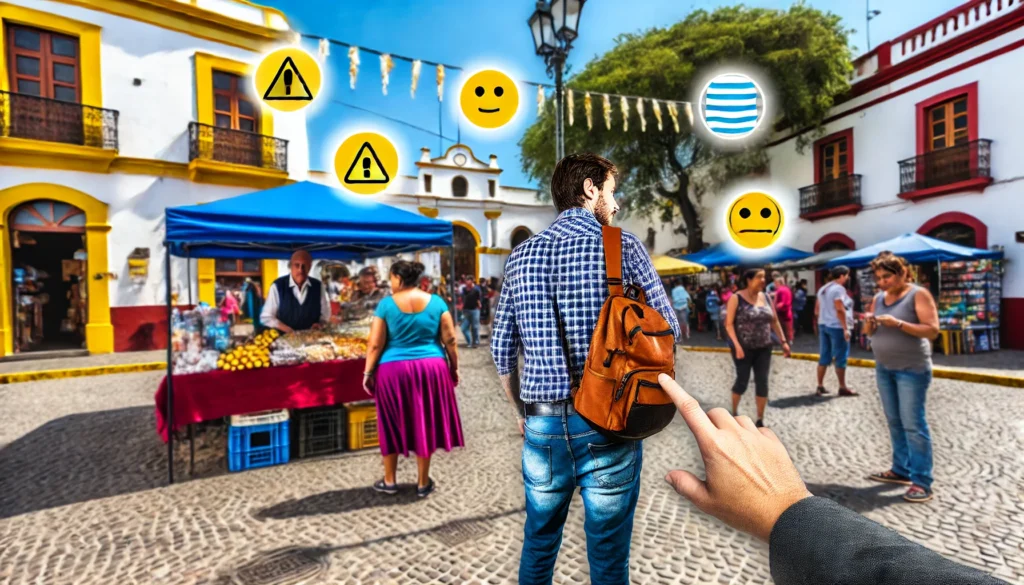
- Trust Your Instincts: If something feels off, don’t hesitate to remove yourself from the situation.
- Research and Plan Ahead: Familiarize yourself with common scams and tourist advisories for specific locations.
- Keep Valuables Secure: Carry only what you need and keep backup cash and cards in a safe location.
- Be Aware of Your Surroundings: Stay alert, especially in crowded places and tourist-heavy areas.
By understanding these common scams and taking proactive steps, you can enjoy the best of Argentina while minimizing potential risks.
Stay informed, be cautious, and make the most of your travel experience!
Travel Tip: If you suspect a scam, confidently say “no, gracias” and walk away without engaging.
Transportation Safety Tips
- Public Transport: Buenos Aires has an efficient subway system (the “Subte”), but petty crime can occur during rush hours. Keep your bags zipped and close to your body.
- Taxis: Use official “Radio Taxis” or apps like Uber for reliable rides.
- Driving: Roads can be chaotic, especially in urban areas. Exercise caution, and if renting a car, opt for reputable providers.
Health and Medical Safety
- Food and Water: Tap water is generally safe in major cities but consider sticking to bottled water if you’re in rural areas.
- Vaccinations: Routine vaccines are typically sufficient, but check for any current advisories before departure.
- Medical Assistance: Argentina offers excellent healthcare, with private hospitals providing high-quality care. Carry travel insurance that covers medical expenses.
Safety Tips for Different Types of Travelers
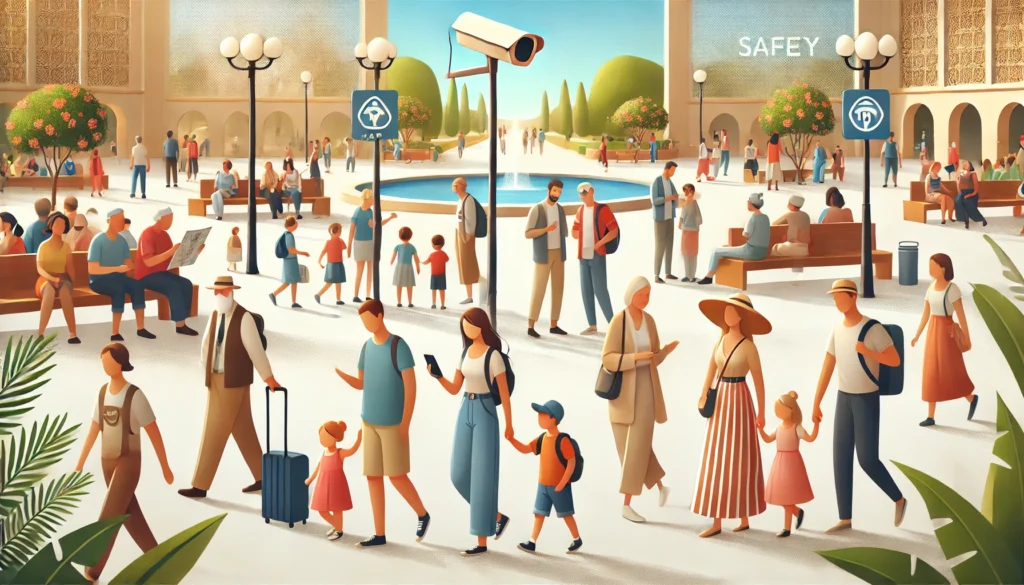
Traveling in Argentina offers an enriching experience, whether you’re exploring solo, with family, or as a group.
However, safety considerations can vary depending on your travel style.
Here are tailored safety tips for different types of travelers to ensure a smooth, worry-free journey.
1. Solo Travelers
Traveling solo in Argentina can be incredibly rewarding, providing ample opportunities for self-discovery and immersion in the local culture.
However, it’s important to prioritize safety.
- Stay Connected: Inform a friend or family member of your travel itinerary and check in regularly. Consider using travel apps that allow you to share your location with trusted contacts.
- Trust Your Instincts: If a situation feels uncomfortable, remove yourself immediately. Whether it’s an unfamiliar street, a suspicious individual, or an uncomfortable interaction, prioritize your gut feelings.
- Blend In: Avoid looking too much like a tourist. Dress modestly, avoid flashy jewelry, and learn a few key Spanish phrases. Being discreet can deter unwanted attention.
- Stay in Well-Lit Areas at Night: While Argentina’s cities are lively, avoid walking alone at night in unfamiliar neighborhoods. Use reputable taxi services or rideshare apps to travel safely after dark.
- Connect with Other Travelers: Stay at hostels or join group tours to meet fellow travelers and share safety tips and experiences.
2. Women Travelers
Argentina is generally welcoming to women travelers, but some cultural nuances and potential challenges warrant specific safety measures.
- Avoid Isolated Areas After Dark: Stick to busy, well-lit areas, and consider traveling with others during nighttime excursions.
- Be Aware of Catcalling: Street harassment can be an issue. If faced with unwanted attention, it’s best to ignore it and continue moving confidently.
- Dress Respectfully: While Argentina is not overly conservative, dressing in a way that blends in with locals may help minimize unwanted attention.
- Opt for Female-Only Accommodations: Many hostels and hotels offer female-only dorms or floors, providing a greater sense of security and comfort.
3. Families with Children
Traveling with children in Argentina can be a delightful experience, but parents should remain vigilant to ensure a safe trip for the entire family.
- Choose Family-Friendly Accommodations: Book hotels with child-friendly amenities, such as cribs, babysitting services, and safe play areas.
- Pack Essentials: Carry a travel kit with basic medications, snacks, and comfort items to manage long waits or unexpected delays.
- Keep a Close Eye in Crowds: Major tourist attractions can be crowded, so consider using child harnesses or holding hands to avoid separation.
- Use Reputable Transport: Opt for safe and well-reviewed transportation options when traveling with young children. Child safety seats are not always common, so bring your own if needed.
4. Group Travelers
Traveling in a group often feels safer, but it’s important to coordinate plans and maintain awareness to prevent complications.
- Establish Meeting Points: If exploring crowded places like markets or festivals, agree on a meeting point in case anyone gets separated.
- Don’t Flash Valuables: While groups can deter some petty criminals, flashy displays of wealth can still attract attention. Keep valuables discreetly stored.
- Plan Ahead for Nightlife: If enjoying Argentina’s famous nightlife, stay together, have a plan to get home safely, and avoid accepting drinks from strangers.
5. LGBTQ+ Travelers
Argentina is one of the most LGBTQ+-friendly countries in Latin America, with progressive laws and a welcoming atmosphere, especially in major cities like Buenos Aires.
- Research Local Events: Buenos Aires hosts vibrant Pride events and has LGBTQ+-friendly clubs, bars, and neighborhoods like Palermo.
- Understand Cultural Nuances: While large cities are open-minded, rural areas may be more conservative. Exercise discretion in less touristy regions.
- Stay at LGBTQ+-Friendly Accommodations: Seek out hotels or establishments that are known to be LGBTQ+-inclusive for a more welcoming experience.
6. Elderly Travelers
For older tourists, safety often involves managing physical challenges, health concerns, and accessibility.
- Plan for Accessibility Needs: Some historical sites may have limited accessibility for individuals with mobility issues. Check ahead for accessibility options or guided tours tailored to your needs.
- Avoid Heavy Luggage: Opt for rolling luggage and consider accommodations that offer porters or elevator access.
- Take Your Time: Argentina’s landscapes and attractions can be vast. Build downtime into your itinerary and stay hydrated.
- Carry Medical Information: Keep a list of medications, allergies, and emergency contacts in your wallet, and ensure you have travel insurance that covers medical needs.
7. Adventure Travelers
Argentina is a haven for outdoor enthusiasts, offering everything from hiking in Patagonia to wine tours in Mendoza.
- Use Licensed Guides: For activities like hiking, mountaineering, or rafting, always go with experienced, licensed guides familiar with the terrain.
- Check Equipment: If renting gear, ensure it’s in good condition and meets safety standards.
- Monitor Weather Conditions: Patagonia and the Andes can have rapidly changing weather. Carry appropriate gear and always inform someone of your travel plans.
General Safety Tips for All Travelers
- Be Cautious with Alcohol Consumption: Drink responsibly to stay aware of your surroundings and avoid risky situations.
- Keep Copies of Important Documents: Carry photocopies of your passport, insurance, and important IDs in case of loss or theft.
- Stay Updated: Follow local news and advisories to stay informed about potential risks or changes in safety conditions.
- Use Secure Bags: Opt for bags with zippers and anti-theft features to prevent pickpocketing.
With these tailored tips, travelers can make the most of their visit to Argentina while staying safe and informed.
By adapting safety strategies to your travel style, you can enjoy Argentina’s diverse offerings with confidence and peace of mind.
Cultural Considerations
- Dress and Behavior: While Argentina is modern and cosmopolitan, respectful behavior and modest dress in certain cultural settings (like churches) are appreciated.
- Greetings: Argentinians are known for their warmth, with cheek kisses being a common greeting. Be prepared to experience a friendly, open culture.
Safety Travel Essentials Summary
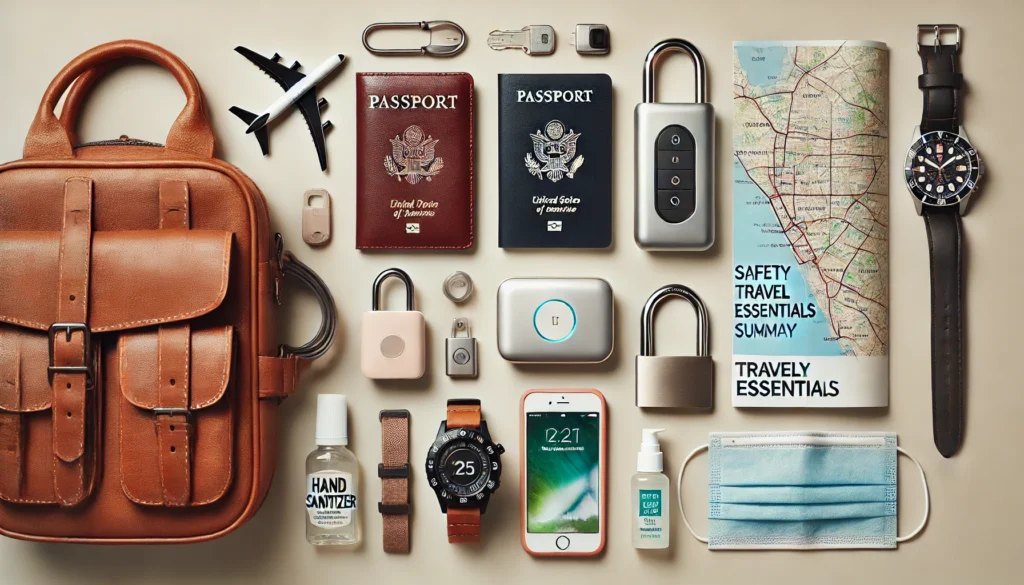
When preparing for your trip to Argentina, equipping yourself with essential safety items can enhance your travel experience.
Here are some recommended products available on Amazon:
- Travel Documents and Copies
- Waterproof Document Holder: Protect your passport and important papers from damage.
- Portable Scanner: Digitize documents for easy access and backup.
- Travel Insurance
- Allianz Travel Insurance: Offers comprehensive coverage for international travelers.
- Money Management Tools
- Zero Grid Money Belt: An RFID-blocking belt to keep your cash and cards secure.
- Master Lock TSA-Approved Luggage Locks: Secure your bags during transit.
- Portable Phone Charger
- Anker PowerCore 10000: A compact and reliable power bank to keep your devices charged.
- Local SIM Card or International Plan
- Google Fi SIM Card Kit: Provides international data coverage without the need to switch SIM cards.
- Personal Safety Alarm or Whistle
- SABRE Personal Alarm: Emits a loud siren to deter potential threats.
- Reusable Water Bottle with Filter
- LifeStraw Go Water Filter Bottle: Ensures safe drinking water by filtering out contaminants.
- Basic First Aid Kit
- Swiss Safe 2-in-1 First Aid Kit: Compact and comprehensive, suitable for travel.
- Flashlight or Headlamp
- Black Diamond Spot Headlamp: Lightweight and powerful, ideal for emergencies.
- Personal Identification and Emergency Contact Information
- Bellroy RFID Blocking Passport Holder: Keeps your ID and emergency contacts organized and protected.
- Travel Locks and Luggage Security
- Forge TSA-Approved Cable Luggage Locks: Flexible and durable, perfect for securing various types of luggage.
- Multi-Tool or Swiss Army Knife
- Victorinox Swiss Army Classic SD Pocket Knife: A versatile tool for everyday tasks.
- Travel-Size Hand Sanitizer and Wet Wipes
- Purell Advanced Hand Sanitizer Gel: Kills germs and fits easily in your bag.
- Language Guide or Translation App
- Lonely Planet Latin American Spanish Phrasebook & Dictionary: A handy guide for basic communication.
- Sunscreen, Insect Repellent, and Protective Clothing
- Neutrogena Ultra Sheer Dry-Touch Sunscreen SPF 55: Provides broad-spectrum protection.
- Sawyer Products Premium Insect Repellent: Effective against mosquitoes and ticks.
- Columbia Men’s Silver Ridge Convertible Pants: Lightweight and protective, suitable for various climates.
- Weather-Appropriate Clothing and Gear
- Marmot PreCip Lightweight Waterproof Rain Jacket: Keeps you dry during unexpected showers.
- Merrell Moab 2 Waterproof Hiking Shoes: Comfortable and durable for exploring diverse terrains.
By incorporating these items into your packing list, you can enhance your safety and comfort while exploring the diverse landscapes and vibrant cities of Argentina.
Accommodation Options

Finding the right place to stay can contribute significantly to your safety and enjoyment in Argentina.
Here are some well-reviewed options available on Expedia:
Buenos Aires
- Palacio Duhau – Park Hyatt Buenos Aires: Located in Recoleta, this luxury hotel offers exceptional security and amenities.
- Selina Palermo: A trendy and budget-friendly option in a vibrant area, ideal for younger travelers.
- Alvear Palace Hotel: Known for its elegance and high-end service, offering peace of mind for families and solo travelers.
Mendoza
- Diplomatic Hotel: Offers comfort and is centrally located, with strong security and welcoming staff.
- Casa de Uco Vineyards & Wine Resort: Perfect for wine lovers seeking a blend of luxury and safety.
Iguazu Falls
- Gran Melia Iguazu: The only hotel located inside the Iguazu National Park, providing unmatched convenience and security.
- Loi Suites Iguazu Hotel: A lush, eco-friendly retreat known for its top-notch service and safety measures.
Booking Tip: Look for properties with high ratings for security and customer service on platforms like Expedia to ensure a pleasant stay.
Emergency Contacts and Resources
- Emergency Number in Argentina: Dial 911 for immediate assistance.
- Tourist Police in Buenos Aires: They are trained to assist travelers with various concerns.
- Embassy Contacts: Keep your country’s embassy contact information handy.
Conclusion: Is Argentina Safe?
With a bit of awareness and preparation, Argentina is a safe and unforgettable destination for tourists.
By following the safety tips outlined above, you can explore the country’s vibrant culture, awe-inspiring landscapes, and captivating history with confidence.
Ready to experience Argentina? Share your safety tips and experiences in the comments below!
Is San Francisco Safe? Latest Updates and Travel Tips
Is Belize Safe for Travelers? What You Need to Know Before You Go
As an Amazon Associate, I earn from qualifying purchases.

